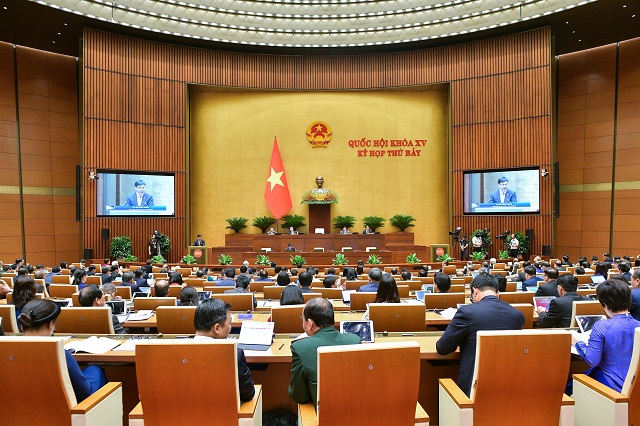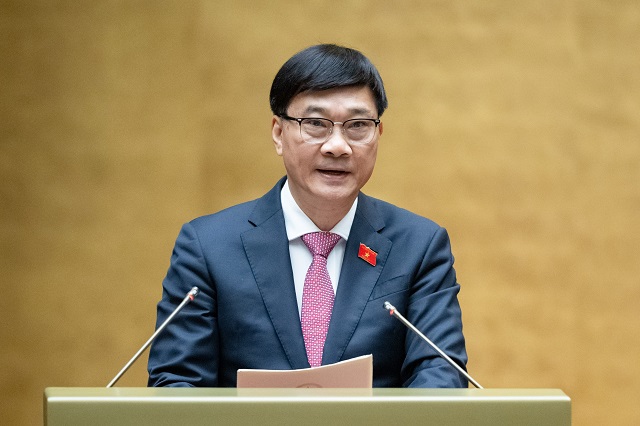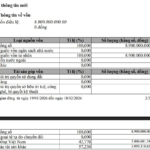
Chairman of the National Assembly’s Economic Committee, Vu Hong Thanh, presents the Inspection Report on the supplementary assessment of the implementation of the 2023 socio-economic development plan and state budget; the situation of implementing the 2024 socio-economic development plan and state budget in the first months of the year
|
On May 20th, at the 7th Session of the 15th National Assembly, Vu Hong Thanh, Chairman of the Economic Committee, presented the Inspection Report on the supplementary assessment of the implementation of the 2023 socio-economic development plan and state budget, as well as the situation of implementing the 2024 socio-economic development plan and state budget in the first months of the year. Alongside the achievements, the socio-economic situation in the first months of 2024 has also revealed challenges and difficulties.
In his report, Chairman Vu Hong Thanh stated that in 2023, under the leadership of the Central Executive Committee of the Communist Party of Vietnam, with the direct and regular involvement of the Politburo and the Secretariat, headed by General Secretary Nguyen Phu Trong, along with the supervision of the National Assembly and the decisive and thorough direction of the Government and the Prime Minister, and with the support of the people and businesses, Vietnam’s socio-economic situation has overcome many challenges and achieved positive results.
The notable achievements include macroeconomic stability, controlled inflation, and ensured major economic balances. Capital disbursement for public investment and infrastructure development was also promoted, laying the foundation for economic recovery and growth. Compared to the report at the 6th session of the 15th National Assembly, some indicators have shown more positive results, such as state budget revenue, trade surplus, and FDI attraction and disbursement. The fields of culture, society, health, education, training, and vocational education continued to receive attention. The construction and completion of the institutional and legal system were also focused on, with a large volume of work completed. National defense and security were maintained, and foreign affairs and international integration achieved many successes.
However, there were also limitations and shortcomings in the socio-economic situation in 2023 that need to be overcome. Economic growth has shown a decreasing trend, and the quality of economic growth remains low and slow to improve. The economic growth target for 2023 was not met, creating a significant challenge for the growth target of the 2021-2025 period. The indicator for increasing social labor productivity in the third year was not achieved. The manufacturing industry slowed down significantly and lost its role as the main driver of growth, while the service sector has not yet demonstrated its role as the leading force in driving growth.
Chairman Vu Hong Thanh also pointed out that budget revenue is not sustainable, and the analysis and forecasting of revenue are not accurate, affecting the quality of the estimates. Tax arrears remain high, and there are difficulties and obstacles in the equitization and state capital divestment of enterprises. There are also issues with the transfer and cancellation of budget allocations at the end of the fiscal year, and the late submission of plans for allocating increased revenue and saving expenses. The proportion of labor in the informal sector remains high, and the quality of labor needs improvement. There is still a shortage of medicine in some public hospitals, and the situation of surplus and shortage of teachers has not been thoroughly resolved, with school violence and food hygiene and safety issues still occurring in some places. Ensuring information security, cybersecurity, and handling toxic information are challenging, and crimes related to social order, corruption, economics, intellectual property infringement, fraud, and asset appropriation in cyberspace are complex.
Regarding the implementation of the 2024 socio-economic development plan and state budget, Chairman Vu Hong Thanh stated that the world situation in 2024 continues to be complex and difficult to predict. Domestically, 2024 is a “sprint” year and is of great importance in implementing the resolutions of the 13th National Party Congress and the National Assembly’s resolutions on the 2021-2025 socio-economic development plan. With this significance and importance, the National Assembly organized an extraordinary 5th session at the beginning of the year to consider important contents, including amending and adopting the Law on Land and the Law on Credit Institutions. The Government and the Prime Minister have also closely directed the implementation of tasks for socio-economic development, state budget estimates, and improving the business environment and national competitiveness. As a result, economic growth has recovered positively.
To achieve the economic growth target and other goals and tasks according to the National Assembly’s resolution on the 2024 socio-economic development plan and other resolutions, in the remaining months of 2024, the Government needs to continue to effectively implement the key tasks and solutions according to the National Assembly’s resolution on the 2024 socio-economic development plan.
 Chairman of the National Assembly’s Economic Committee, Vu Hong Thanh, presenting the Report
|
Chairman of the Economic Committee emphasized some priorities in macroeconomic management. Specifically, it is necessary to enhance endogenous capacity, promote rapid and sustainable economic growth, stabilize the macroeconomy, ensure the major balances of the economy, control inflation, and prevent exchange rate shocks that affect the lives of the people, production, business, and import and export activities. It is also crucial to improve the capacity for analysis, forecasting, and timely policy response. Continuing to restructure the economy and innovate the growth model, consolidating and maintaining the main growth drivers, and promoting new growth drivers are essential.
Effective solutions are needed to remove bottlenecks in labor productivity, promote the use of clean energy, digital transformation, and the application of science and technology, and quickly and effectively implement the Master Plan and Plan for implementing the Power Development Master Plan VIII. Ensuring the supply of essential commodities, especially electricity, gasoline, and oil, is crucial to prevent power shortages affecting production, business, and people’s lives.
Additionally, it is necessary to continue to proactively, flexibly, timely, and effectively manage monetary policy. Maintaining liquidity stability and ensuring the safety of the banking system, resolutely and effectively implementing the project to restructure credit institutions in association with handling bad debts, and handling weak banks are key tasks. There should also be fundamental and sustainable solutions to redirect money flow back to production and business, along with measures to reduce lending interest rates. Strengthening the management and supervision of the securities market, the corporate bond market, and the real estate market, along with measures to stabilize and promote the development of these markets, is essential to reinforce investors’ confidence. Harmonizing monetary and fiscal policies to promote economic growth is also crucial.
Furthermore, it is important to enhance management, prevent tax losses, transfer pricing, and commercial fraud, actively recover tax debts, and closely manage expenses according to estimates, ensuring efficiency and saving resources for key national projects, salary reform, and social welfare. Proactive control and response to risks, ensuring a balanced state budget, and managing deficit and public debt are also priorities. Saving resources and preventing waste and negativity in the management and use of the state budget are essential.












